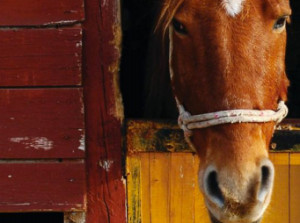Trainer Liabilities for Horses in Their Care
Click here to read the complete article316 – October, 2016
BY JULIE I. FERSHTMAN, ATTORNEY AT LAW
 Dan hired a trainer, Sarah, to train his horse and haul it to a few shows during the year. While under Sarah’s care, however, Dan’s horse colicked, and a veterinarian had to put the horse down. Should Sarah, the trainer, be responsible for paying for the loss of Dan’s horse and his vet bills?
Dan hired a trainer, Sarah, to train his horse and haul it to a few shows during the year. While under Sarah’s care, however, Dan’s horse colicked, and a veterinarian had to put the horse down. Should Sarah, the trainer, be responsible for paying for the loss of Dan’s horse and his vet bills?
What the Law Expects of a Trainer’s Services
When a person, such as Dan, leaves a horse with a trainer for care, keeping, and training, the law generally requires the trainer to use “reasonable care” in carrying out these tasks. This means that the trainer must use the degree of care that a prudent and careful trainer would use in similar circumstances.
If Dan brings a claim or lawsuit against his trainer for injuries to or losses of his horse, he must prove that the trainer somehow fell short of this standard, that the trainer’s failings were the legal cause of the horse’s demise, that the trainer should be legally accountable for damages that resulted, and his legally compensable losses.
Difficulties and Complexities of Suing Horse Trainers
The loss of a horse is unfortunate, but courts will expect Dan to do far more than merely point to the loss of his horse and blame the trainer. Proving that the trainer is legally responsible for the loss can be a complicated process for a few reasons:
• Even with very good care, horses can develop colic.
• Dan’s horse might have harbored a condition that made it more likely to colic, having nothing to do with the quality of care that Sarah and her staff gave the horse.
• To prove that improper care caused his horse’s demise, Dan may need to retain an expert witness veterinarian. That expert would evaluate the evidence, such as necropsy information, veterinary records, surgical records, evaluation of the horse (if it is alive), and all other documents. The expert might also need to conduct further tests on the horse. Afterwards, Dan would hope that the expert will support his case that improper care led to the horse’s demise, to a reasonable degree of veterinary certainty.
• Dan might expect people at the stable, who witnessed first-hand the care and attention the trainer gave Dan’s horse, to testify against the trainer. That might not happen. They might not want to be involved. Even if Dan’s lawyer serves subpoenas on everyone to testify at a deposition or trial, their testimony could be unpredictable.
316 – October, 2016










